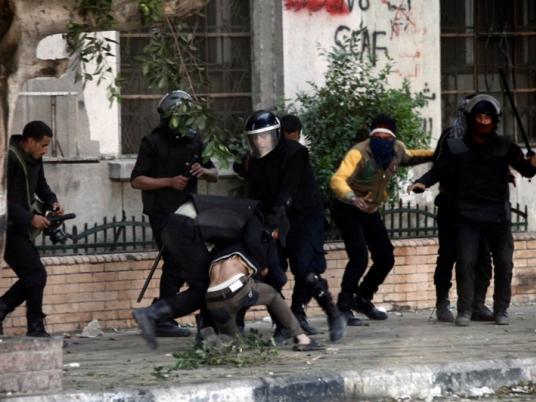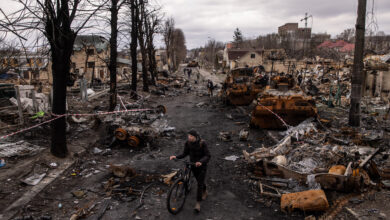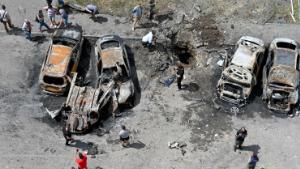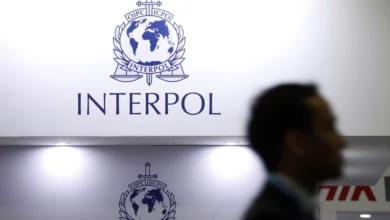
Human rights abuses have continued unabated since President Mohamed Morsy took office, the Human Rights Watch asserted in its yearly report on the MENA region.
“After what has become known as the Arab Spring, the biggest challenge that the countries of the region still face is to cut ties with a past built on the lack of accountability, and to build a new nation on the principles of the law and human rights,” said Tamara al-Rifai, a spokesperson for HRW’s MENA division, at a press conference held in Cairo on Thursday to launch the report.
All MENA countries, whether they are in the midst of a post-revolution transformation or have remain untouched by the Arab Spring, are still allowing numerous human rights abuses to continue.
The report acknowledges that the transition out of oppressive, dictatorial regimes has historically been challenging, and urges the people of the region not to lose faith in the democratic process and to persist on the road to political tansformation.
“Building a state that respects freedoms and rights may not be as thrilling and exhilarating as throwing off a dictatorial and human rights abusive regime,” writes HRW Executive Director Kenneth Roth in his introduction to the report, and “the process of building effective institutions, independent courts, effective political units and training officials to protect human rights and the rule of law may be a grueling process, but all these missions are necessary if we don’t want the revolution to be a path to take us back to oppression under a new title."
The main challenges facing the region are identified in the report as the arrogance of the majorities who oppress minorities, lack of justice, violation of women’s rights, limitations on the freedom of expression and the instrumentalization of cultural traditions as a justification to oppress freedoms.
Although 2012 saw Egypt transition from military rule to its first democratically elected president, the election of the first post-revolution Parliament and the passing of a new Constitution, HRW’s report states that major human rights violations persisted in that year. These abuses included excessive police violence, and harsh limitations on freedom of expression, women’s rights, labor rights, freedom of belief and freedom of organization.
“The most significant aspect of 2012 is the lost opportunities for reform,” declares Heba Morayef, director of HRW’s Egypt division.
Morayef says that the Parliament, which was dismantled in June by a court order, failed to pass many draft laws that would have improved the conditions of human rights and freedoms — including a law banning the military trial of civilians, and laws protecting the freedom of information, NGOs and the freedom to create independent syndicates.
The second lost opportunity comes with the new Constitution, Morayef asserts. By tying all freedoms to vague limitations, such as family and social values, the new Constitution gives less protection to freedoms than its predecessor, the 1971 Constitution.
Article 81 is particularly troublesome, Morayef notes — it stipulates that exercising rights and freedoms cannot conflict with the constitutional section on state and society, which includes ambiguous wording such as the “role of the state in maintaining the inherent character of the Egyptian family.”
Furthermore, oppressive laws dating back to the Mubarak regime were used against journalists and activists before the revolution, and the new Constitution allows for a further crackdown on the freedom of media, HRW's report says.
Since Morsy’s election, one television station was shut down, three issues of newspapers were banned, nine journalists were investigated and a judge was asked to carry out investigations into cases of insulting the judiciary. At least 17 individuals have been charged with defaming the president, and 18 others with defaming the judiciary.
“There should not be such a crime as insulting a president or an institution. Any political criticism can then be turned into a crime of defamation,” argues Morayef, adding that defamation crimes should protect the people and should only be punishable with fines, rather than jail time.
The report also states that the use of excessive force by the police and the military continued throughout 2012, coupled with a lack of accountability for those responsible for present and past violations.
The killing of protesters in the early days of the revolution in 2011 goes largely unpunished to this day, the report asserts. Thirty-five court cases related to the killings resulted in only two officers being imprisoned, while the rest were released either with not-guilty verdicts or suspended sentences.
Morayef demands the release of the recent fact finding report that was prepared by a committee appointed by the president. She says the report is the first official investigation to address the use of excessive violence and torture by the military, but its results have not been made public despite repeated demands.
“Until now there is no acknowledgment or condemnation by the state of the use of excessive force by the police and the military,” says Morayef.
As long as the Constitution protects the military from being prosecuted in front of a civilian court, the Armed Forces will never face justice for its violations, she argues: “The military judiciary is biased and will always protect its men.”
The report also criticizes the public prosecutor for not investigating charges of torture levied against the police force, and not conducting serious investigation into most cases of sectarian violence. It goes on to conemn the continuation of exceptional measures, such as the trial of civilians in military courts and the excessive implementation of a state of emergency.
Morayef says that the Constitution failed to ban trials of civilians in military courts, and in fact safeguards this practice in cases that affect the military. Additionally, she says that while a presidential pardon released 700 detainees held on charges related to their participation in protests since the revolution, it failed to demand the retrial of those found guilty by military courts in front of a civilian court, and to delegitimize military trials altogether.
In his conclusion to the report, Roth urges the new leaders of the region to make sure that the Arab Spring leads to a positive transformation.
“The Arab Spring continues to give hope for a better human rights environment in one of the regions most resistant to democratic transformation in the world, but it also shed a light on the tension between the majority rule and respecting rights, it’s very important for the people of these areas and the world that these tensions are resolved ,” he wrote.




